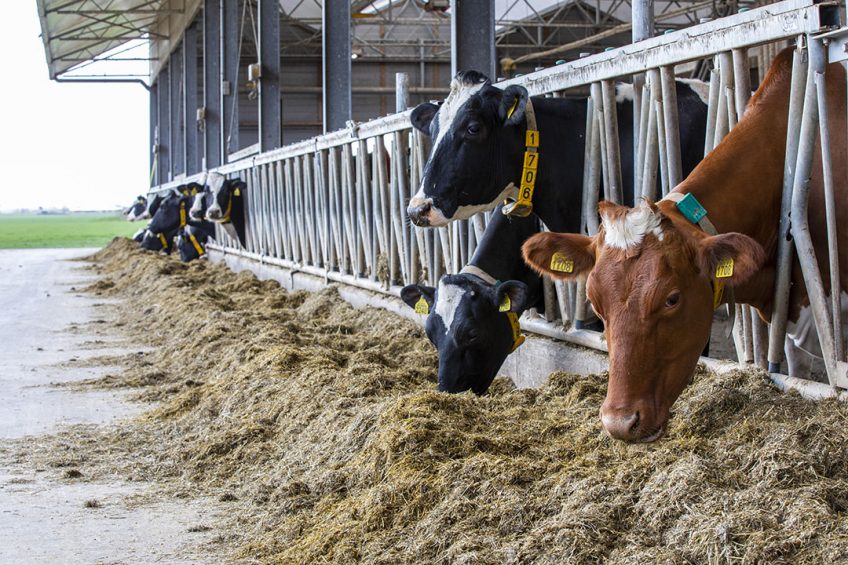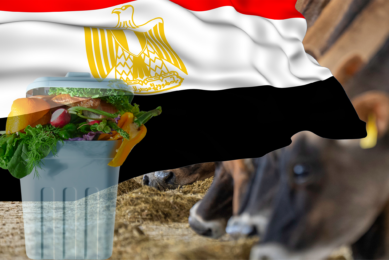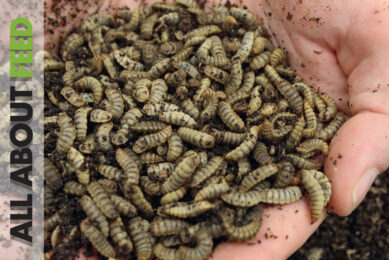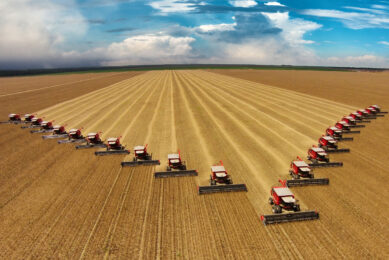Alltech ONE discusses how to feed the future

One of the topics addressed at the recent virtual Alltech ONE ideas conference was how to feed our livestock in the future. Several speakers discussed how to take into account the carbon footprint, sustainable feed sources and human and animal health, while producing enough food in the future.
Higher milk production, lower carbon hoofprint
Dairy production is growing across the world at a rate of 25% but with this increase brings greater sustainability challenges.
Some of the main pressures involved with increased production of milk include land availability and the rising costs of other inputs required such as feed.
Dr Saheed Salami, research fellow at Alltech, outlined some of the main sustainability challenges farmers face at the Alltech ONE Ideas conference.
He said: “Greenhouse gas emission remains a top topic now. And I think with the Joe Biden Climate Summit recently, that happens to be more resonating for the industry, especially in reducing greenhouse gas emissions from the livestock chain.
Dairy sector produces the second largest sources of emissions
“It’s very clear that going forward it’s not going to be business as usual, and stricter environmental regulations will come in from the government, and much of the dairy industry have to adapt to these changes.” Dr Salami recognised that the dairy industry produces the second largest sources of emissions in the livestock sector. He added: “So what we see there is that enteric emission from the rumen and feed use actually contribute the 2 largest sources of emissions on dairy farms, which contribute over 60% of the total emissions.
“We still have other sources of emissions like manure, which is nitrous oxide specifically, and also artificial fertiliser and electricity use. But of course, we know that if we have to achieve a more sustainable dairy farm, we need to be able to focus on all of these sectors on the farm to be able to reduce emissions. “More specifically reducing enteric methane and feed use offer a large opportunity for us to reduce greenhouse gas emissions,” he said. The answers, said Dr Salami, involved being able to increase feed digestibility, and reduce the use of high carbon inputs in feed ingredients and being able to utilise nitrogen from the feed better.
Feeding your future: The changing face of aqua feed
The growth rate of the aquaculture industry intensifies globally, therefore, does the demand for good quality fish feed. The challenge with this growth is the fact that the availability of fishmeal is limited and currently estimates 3 million tonnes globally. The industry is trying to monitor the fishmeal demand to ensure there is enough supply and new alternatives to fishmeal are being investigated.
Speaking at the Alltech ONE ideas conference, Ben Lamberigts, research and nutrition manager, Alltech Coppens, said the fishmeal challenge has to be solved before the industry can grow. Since the 90s the industry is already lowering the FIFO factor (Fish In, Fish Out), which basically is the number of wild caught fish needed to produce one kilogram of farmed fish.
Lamberigts said: “Globally, we are producing 45 million kilograms of farmed fish. This is the sum of the 11 most important farmed species in the world. To produce this 45 million kilograms of aquacultured fish, we still need 12 million kilograms of wild caught fish to use as fishmeal in our fish feeds. “If we divide these 2, we have a FIFO factor, so fish in fish out factor, of 0.27. That means that with one kilogram of wild caught fish we are able to produce 3.7 kilogram of farmed fish.”
Other sources of fishmeal include haemoglobin, blood meal or poultry meal as animal byproducts. Also sunflower meal, wheat protein and soy products as vegetable protein sources. And insect meals like meal worms or black soldier fly meal.
We have inherited a beautiful planet from our ancestors, people we can no longer hear, and we are about to pass it on to our descendants, people we cannot yet see. Our job is to leave this amazing planet in better shape than when we got here.
Farmers can be the saviours of Mother Earth
Mother Earth is currently under a great deal of pressure feeling the pain of billions of inhabitants going about their daily lives sometimes with complete disregard to the damage they are causing. During his keynote speech, David McWilliams, economist and professor at Trinity College Dublin, Ireland, discussed the world and the Covid-19 pandemic. He said: “We have inherited a beautiful planet from our ancestors, people we can no longer hear, and we are about to pass it on to our descendants, people we cannot yet see. Our job is to leave this amazing planet in better shape than when we got here.”
The pressures, said Prof McWilliams, include global warming, rising sea levels, polluted rivers, parched lands, blackened skies, and global pandemics. He said, “We all have a fair idea where the story ends. But there is an alternative. It’s legacy thinking. And the farmer, the traditional steward of our planet, its animals, its land, forests, and rivers, can be its saviour.” Prof McWilliams continued, “So, with just one planet to share, we‘re all in this together. Conservationists and consumers, farmers and activists, industry and government, man and Mother Nature, and the goal is the 3 H’s, healthy people, healthy society, and a healthy planet.”
His take-home message was that agriculture is the reason our civilisations developed, and our food systems and diets still remain diverse and amazingly responsive. “While the challenge of feeding the growing planet will fall on fewer shoulders than was the case in the past, with innovation and the will to be that good ancestor, we will continue to produce more with less, and this time, for a healthier people, healthier society, and a healthier planet,” he said.
It’s our utilisation of fossil fuels that is driving climate change. And so if all of humanity turned into vegans, we would not actually save our climate challenge.
A different diet will not save the planet
New eating habits and an ever-increasing focus on agricultural effects on the environment focused heavily during the keynote speech by Dr Mark Lyons, president and CEO of Alltech. He said: “They are saying that we need to change our diet in order to save our planet. And while their ideas may not be based on fact, they are certainly not alone. We can see in many media publications a lot of negativity towards agriculture and specifically animal agriculture and particularly also the area of beef production.”
Dr Lyons highlighted how some of the best restaurants in the world are removing beef from their menus and how the protein is also being removed from many recipes, all because some people think producing beef harms the climate. Europe has introduced the Green Deal and in the United States the Biden administration is drawing up its own climate programme. One surprise though is that Argentina, a major beef producer, has launched a Green Mondays programme encouraging people to replace meat with plant-based proteins.
Dr Lyons said farmers need to stand up for their industry when it came to the benefits of farming on the environment. He quoted one surprising figure that if the United States eliminated all its dairy cows, greenhouse gas emissions there would only fall by 0.7%, and at the same time remove 39 essential nutrients from human diets. His apt conclusions were that: “We really have to realise that we will not save the planet with a different plate. It’s our utilisation of fossil fuels that is driving climate change. And so if all of humanity turned into vegans, we would not actually save our climate challenge.”











